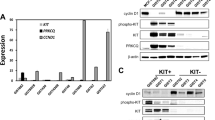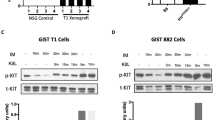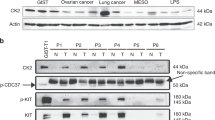Abstract
Oncogenic KIT or PDGFRA receptor tyrosine kinase mutations are compelling therapeutic targets in gastrointestinal stromal tumors (GISTs), and the KIT/PDGFRA kinase inhibitor, imatinib, is standard of care for patients with metastatic GIST. However, most of these patients eventually develop clinical resistance to imatinib and other KIT/PDGFRA kinase inhibitors and there is an urgent need to identify novel therapeutic strategies. We reported previously that protein kinase C-θ (PKCθ) is activated in GIST, irrespective of KIT or PDGFRA mutational status, and is expressed at levels unprecedented in other mesenchymal tumors, therefore serving as a diagnostic marker of GIST. Herein, we characterize biological functions of PKCθ in imatinib-sensitive and imatinib-resistant GISTs, showing that lentivirus-mediated PKCθ knockdown is accompanied by inhibition of KIT expression in three KIT+/PKCθ+ GIST cell lines, but not in a comparator KIT+/PKCθ− Ewing's sarcoma cell line. PKCθ knockdown in the KIT+ GISTs was associated with inhibition of the phosphatidylinositol-3-kinase/AKT signaling pathway, upregulation of the cyclin-dependent kinase inhibitors p21 and p27, antiproliferative effects due to G1 arrest and induction of apoptosis, comparable to the effects seen after direct knockdown of KIT expression by KIT short-hairpin RNA. These novel findings highlight that PKCθ warrants clinical evaluation as a potential therapeutic target in GISTs, including those cases containing mutations that confer resistance to KIT/PDGFRA kinase inhibitors.
This is a preview of subscription content, access via your institution
Access options
Subscribe to this journal
Receive 50 print issues and online access
$259.00 per year
only $5.18 per issue
Buy this article
- Purchase on Springer Link
- Instant access to full article PDF
Prices may be subject to local taxes which are calculated during checkout




Similar content being viewed by others
References
Allander SV, Nupponen NN, Ringner M, Hostetter G, Maher GW, Goldberger N et al. (2001). Gastrointestinal stromal tumors with KIT mutations exhibit a remarkably homogeneous gene expression profile. Cancer Res 61: 8624–8628.
Altman A, Villalba M . (2003). Protein kinase C-theta (PKCtheta): it's all about location, location, location. Immunol Rev 192: 53–63.
Ashton AW, Watanabe G, Albanese C, Harrington EO, Ware JA, Pestell RG . (1999). Protein kinase Cdelta inhibition of S-phase transition in capillary endothelial cells involves the cyclin-dependent kinase inhibitor p27(Kip1). J Biol Chem 274: 20805–20811.
Baier G, Telford D, Giampa L, Coggeshall KM, Baier-Bitterlich G, Isakov N et al. (1993). Molecular cloning and characterization of PKC theta, a novel member of the protein kinase C (PKC) gene family expressed predominantly in hematopoietic cells. J Biol Chem 268: 4997–5004.
Banan A, Zhang LJ, Shaikh M, Fields JZ, Choudhary S, Forsyth CB et al. (2005). Theta isoform of protein kinase C alters barrier function in intestinal epithelium through modulation of distinct claudin isotypes: a novel mechanism for regulation of permeability. J Pharmacol Exp Ther 313: 962–982.
Banan A, Zhang LJ, Shaikh M, Fields JZ, Farhadi A, Keshavarzian A . (2004). Theta-isoform of PKC is required for alterations in cytoskeletal dynamics and barrier permeability in intestinal epithelium: a novel function for PKC-theta. Am J Physiol Cell Physiol 287: C218–C234.
Bauer B, Krumbock N, Fresser F, Hochholdinger F, Spitaler M, Simm A et al. (2001). Complex formation and cooperation of protein kinase C theta and Akt1/protein kinase B alpha in the NF-kappa B transactivation cascade in Jurkat T cells. J Biol Chem 276: 31627–31634.
Bauer S, Duensing A, Demetri GD, Fletcher JA . (2007). KIT oncogenic signaling mechanisms in imatinib-resistant gastrointestinal stromal tumor: PI3-kinase/AKT is a crucial survival pathway. Oncogene 26: 7560–7568.
Bi K, Tanaka Y, Coudronniere N, Sugie K, Hong S, Van Stipdonk MJ et al. (2001). Antigen-induced translocation of PKC-theta to membrane rafts is required for T cell activation. Nat Immunol 2: 556–563.
Blay JY, Bonvalot S, Casali P, Choi H, Biec-Richter M, Dei Tos AP et al. (2005). Consensus meeting for the management of gastrointestinal stromal tumors. Report of the GIST Consensus Conference of 20–21 March 2004, under the auspices of ESMO. Ann Oncol 16: 566–578.
Blay P, Astudillo A, Buesa JM, Campo E, Abad M, Garcia-Garcia J et al. (2004). Protein kinase C theta is highly expressed in gastrointestinal stromal tumors but not in other mesenchymal neoplasias. Clin Cancer Res 10: 4089–4095.
Blume-Jensen P, Ronnstrand L, Gout I, Waterfield MD, Heldin CH. (1994). Modulation of Kit/stem cell factor receptor-induced signaling by protein kinase C. J Biol Chem 269: 21793–21802.
Blume-Jensen P, Siegbahn A, Stabel S, Heldin CH, Ronnstrand L . (1993). Increased Kit/SCF receptor induced mitogenicity but abolished cell motility after inhibition of protein kinase C. EMBO J 12: 4199–4209.
Blume-Jensen P, Wernstedt C, Heldin CH, Ronnstrand L . (1995). Identification of the major phosphorylation sites for protein kinase C in kit/stem cell factor receptor in vitro and in intact cells. J Biol Chem 270: 14192–14200.
Cerda SR, Mustafi R, Little H, Cohen G, Khare S, Moore C et al. (2006). Protein kinase C delta inhibits Caco-2 cell proliferation by selective changes in cell cycle and cell death regulators. Oncogene 25: 3123–3138.
Chang JD, Xu Y, Raychowdhury MK, Ware JA . (1993). Molecular cloning and expression of a cDNA encoding a novel isoenzyme of protein kinase C (nPKC). A new member of the nPKC family expressed in skeletal muscle, megakaryoblastic cells, and platelets. J Biol Chem 268: 14208–14214.
Corless CL, Fletcher JA, Heinrich MC . (2004). Biology of gastrointestinal stromal tumors. J Clin Oncol 22: 3813–3825.
Corless CL, Schroeder A, Griffith D, Town A, McGreevey L, Harrell P et al. (2005). PDGFRA mutations in gastrointestinal stromal tumors: frequency, spectrum and in vitro sensitivity to imatinib. J Clin Oncol 23: 5357–5364.
Debiec-Rychter M, Cools J, Dumez H, Sciot R, Stul M, Mentens N et al. (2005). Mechanisms of resistance to imatinib mesylate in gastrointestinal stromal tumors and activity of the PKC412 inhibitor against imatinib-resistant mutants. Gastroenterology 128: 270–279.
Deeds L, Teodorescu S, Chu M, Yu Q, Chen CY . (2003). A p53-independent G1 cell cycle checkpoint induced by the suppression of protein kinase C alpha and theta isoforms. J Biol Chem 278: 39782–39793.
Demetri GD, von MM, Blanke CD, Van den Abbeele AD, Eisenberg B, Roberts PJ et al. (2002). Efficacy and safety of imatinib mesylate in advanced gastrointestinal stromal tumors. N Engl J Med 347: 472–480.
Drevs J, Medinger M, Schmidt-Gersbach C, Weber R, Unger C . (2003). Receptor tyrosine kinases: the main targets for new anticancer therapy. Curr Drug Targets 4: 113–121.
Duensing A, Joseph NE, Medeiros F, Smith F, Hornick JL, Heinrich MC et al. (2004a). Protein kinase C theta (PKCtheta) expression and constitutive activation in gastrointestinal stromal tumors (GISTs). Cancer Res 64: 5127–5131.
Duensing A, Medeiros F, McConarty B, Joseph NE, Panigrahy D, Singer S et al. (2004b). Mechanisms of oncogenic KIT signal transduction in primary gastrointestinal stromal tumors (GISTs). Oncogene 23: 3999–4006.
Fletcher CD, Berman JJ, Corless C, Gorstein F, Lasota J, Longley BJ et al. (2002). Diagnosis of gastrointestinal stromal tumors: a consensus approach. Hum Pathol 33: 459–465.
Frey MR, Saxon ML, Zhao X, Rollins A, Evans SS, Black JD . (1997). Protein kinase C isozyme-mediated cell cycle arrest involves induction of p21(waf1/cip1) and p27(kip1) and hypophosphorylation of the retinoblastoma protein in intestinal epithelial cells. J Biol Chem 272: 9424–9435.
Gschwind A, Fischer OM, Ullrich A . (2004). The discovery of receptor tyrosine kinases: targets for cancer therapy. Nat Rev Cancer 4: 361–370.
Heinrich MC, Corless CL, Blanke CD, Demetri GD, Joensuu H, Roberts PJ et al. (2006). Molecular correlates of imatinib resistance in gastrointestinal stromal tumors. J Clin Oncol 24: 4764–4774.
Heinrich MC, Corless CL, Duensing A, McGreevey L, Chen CJ, Joseph N et al. (2003). PDGFRA activating mutations in gastrointestinal stromal tumors. Science 299: 708–710.
Hirota S, Isozaki K, Moriyama Y, Hashimoto K, Nishida T, Ishiguro S et al. (1998). Gain-of-function mutations of c-kit in human gastrointestinal stromal tumors. Science 279: 577–580.
Ishaq M, Fan M, Wigmore K, Gaddam A, Natarajan V . (2002). Regulation of retinoid X receptor responsive element-dependent transcription in T lymphocytes by Ser/Thr phosphatases: functional divergence of protein kinase C (PKC)theta; and PKC alpha in mediating calcineurin-induced transactivation. J Immunol 169: 732–738.
Janeway KA, Liegl B, Harlow A, Le C, Perez-Atayde A, Kozakewich H et al. (2007). Pediatric KIT wild-type and platelet-derived growth factor receptor alpha-wild-type gastrointestinal stromal tumors share KIT activation but not mechanisms of genetic progression with adult gastrointestinal stromal tumors. Cancer Res 67: 9084–9088.
Jiang XH, Lam SK, Lin MC, Jiang SH, Kung HF, Slosberg ED et al. (2002). Novel target for induction of apoptosis by cyclo-oxygenase-2 inhibitor SC-236 through a protein kinase C-beta(1)-dependent pathway. Oncogene 21: 6113–6122.
Lee KY, D'Acquisto F, Hayden MS, Shim JH, Ghosh S . (2005). PDK1 nucleates T cell receptor-induced signaling complex for NF-kappaB activation. Science 308: 114–118.
Liu Y, Witte S, Liu YC, Doyle M, Elly C, Altman A . (2000). Regulation of protein kinase Ctheta function during T cell activation by Lck-mediated tyrosine phosphorylation. J Biol Chem 275: 3603–3609.
Lux ML, Rubin BP, Biase TL, Chen CJ, Maclure T, Demetri G et al. (2000). KIT extracellular and kinase domain mutations in gastrointestinal stromal tumors. Am J Pathol 156: 791–795.
Medeiros F, Corless CL, Duensing A, Hornick JL, Oliveira AM, Heinrich MC et al. (2004). KIT-negative gastrointestinal stromal tumors: proof of concept and therapeutic implications. Am J Surg Pathol 28: 889–894.
Medinger M, Drevs J . (2005). Receptor tyrosine kinases and anticancer therapy. Curr Pharm Des 11: 1139–1149.
Motegi A, Sakurai S, Nakayama H, Sano T, Oyama T, Nakajima T . (2005). PKC theta, a novel immunohistochemical marker for gastrointestinal stromal tumors (GIST), especially useful for identifying KIT-negative tumors. Pathol Int 55: 106–112.
Nielsen TO, West RB, Linn SC, Alter O, Knowling MA, O′Connell JX et al. (2002). Molecular characterisation of soft tissue tumours: a gene expression study. Lancet 359: 1301–1307.
Paez JG, Janne PA, Lee JC, Tracy S, Greulich H, Gabriel S et al. (2004). EGFR mutations in lung cancer: correlation with clinical response to gefitinib therapy. Science 304: 1497–1500.
Rastinejad F . (2001). Retinoid X receptor and its partners in the nuclear receptor family. Curr Opin Struct Biol 11: 33–38.
Rossi F, Ehlers I, Agosti V, Socci ND, Viale A, Sommer G et al. (2006). Oncogenic Kit signaling and therapeutic intervention in a mouse model of gastrointestinal stromal tumor. Proc Natl Acad Sci USA 103: 12843–12848.
Rubin BP, Singer S, Tsao C, Duensing A, Lux ML, Ruiz R et al. (2001). KIT activation is a ubiquitous feature of gastrointestinal stromal tumors. Cancer Res 61: 8118–8121.
Sordella R, Bell DW, Haber DA, Settleman J . (2004). Gefitinib-sensitizing EGFR mutations in lung cancer activate anti-apoptotic pathways. Science 305: 1163–1167.
Southwell BR . (2003). Localization of protein kinase C theta immunoreactivity to interstitial cells of Cajal in guinea-pig gastrointestinal tract. Neurogastroenterol Motil 15: 139–147.
Sun Z, Arendt CW, Ellmeier W, Schaeffer EM, Sunshine MJ, Gandhi L et al. (2000). PKC-theta is required for TCR-induced NF-kappaB activation in mature but not immature T lymphocytes. Nature 404: 402–407.
Tarn C, Skorobogatko YV, Taguchi T, Eisenberg B, Von MM, Godwin AK . (2006). Therapeutic effect of imatinib in gastrointestinal stromal tumors: AKT signaling dependent and independent mechanisms. Cancer Res 66: 5477–5486.
Teixeira C, Stang SL, Zheng Y, Beswick NS, Stone JC . (2003). Integration of DAG signaling systems mediated by PKC-dependent phosphorylation of RasGRP3. Blood 102: 1414–1420.
Tuveson DA, Willis NA, Jacks T, Griffin JD, Singer S, Fletcher CD et al. (2001). STI571 inactivation of the gastrointestinal stromal tumor c-KIT oncoprotein: biological and clinical implications. Oncogene 20: 5054–5058.
Villalba M, Bi K, Hu J, Altman Y, Bushway P, Reits E et al. (2002). Translocation of PKC[theta] in T cells is mediated by a nonconventional, PI3-K- and Vav-dependent pathway, but does not absolutely require phospholipase C. J Cell Biol 157: 253–263.
Villalba M, Kasibhatla S, Genestier L, Mahboubi A, Green DR, Altman A . (1999). Protein kinase ctheta cooperates with calcineurin to induce Fas ligand expression during activation-induced T cell death. J Immunol 163: 5813–5819.
Wang D, Matsumoto R, You Y, Che T, Lin XY, Gaffen SL et al. (2004). CD3/CD28 costimulation-induced NF-kappaB activation is mediated by recruitment of protein kinase C-theta, Bcl10, and IkappaB kinase beta to the immunological synapse through CARMA1. Mol Cell Biol 24: 164–171.
Zhu MJ, Ou WB, Fletcher CD, Cohen PS, Demetri GD, Fletcher JA . (2007). KIT oncoprotein interactions in gastrointestinal stromal tumors: therapeutic relevance. Oncogene 26: 6386–6395.
Acknowledgements
This work was supported by grants from an anonymous donor, GI SPORE 1P50CA127003-01, the Life Raft Group, Cesarini Team for the Pan-Massachusetts Challenge, the Virginia and Daniel K Ludwig Trust for Cancer Research, the Ronald O Perelman Fund for Cancer Research, the Stutman GIST Cancer Research Fund, the Rubenstein Foundation and Leslie's Links. We thank Sarah E Bulmer and William Hahn for providing shRNA constructs.
Author information
Authors and Affiliations
Corresponding authors
Additional information
Supplementary Information accompanies the paper on the Oncogene website (http://www.nature.com/onc)
Rights and permissions
About this article
Cite this article
Ou, Wb., Zhu, Mj., Demetri, G. et al. Protein kinase C-θ regulates KIT expression and proliferation in gastrointestinal stromal tumors. Oncogene 27, 5624–5634 (2008). https://doi.org/10.1038/onc.2008.177
Received:
Revised:
Accepted:
Published:
Issue Date:
DOI: https://doi.org/10.1038/onc.2008.177
Keywords
This article is cited by
-
PRKCQ inhibition enhances chemosensitivity of triple-negative breast cancer by regulating Bim
Breast Cancer Research (2020)
-
Coordinated targeting of CK2 and KIT in gastrointestinal stromal tumours
British Journal of Cancer (2020)
-
Cyclin D1 is a mediator of gastrointestinal stromal tumor KIT-independence
Oncogene (2019)
-
Complementary activity of tyrosine kinase inhibitors against secondary kit mutations in imatinib-resistant gastrointestinal stromal tumours
British Journal of Cancer (2019)
-
MAX inactivation is an early event in GIST development that regulates p16 and cell proliferation
Nature Communications (2017)



